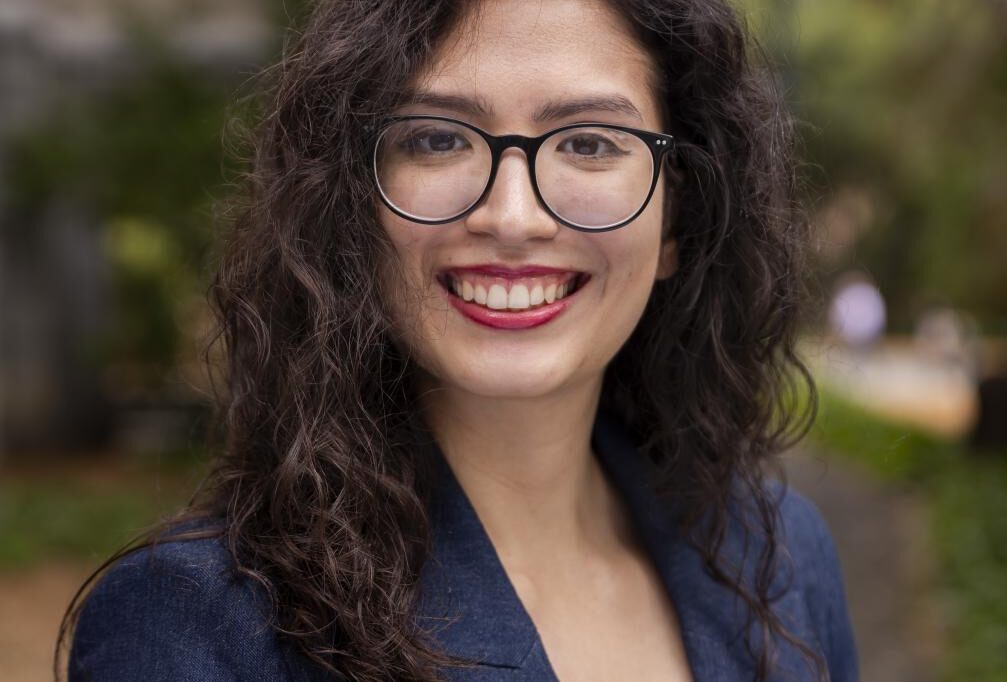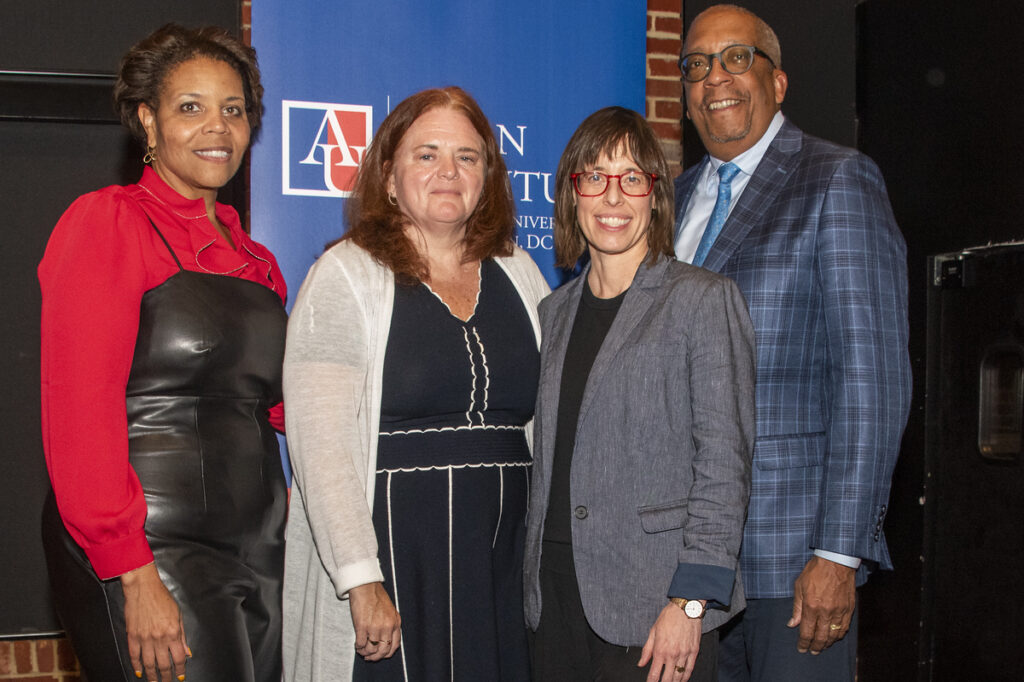On December 7, 2023, the Center for Long-Term Cybersecurity (CLTC) and Cyversity hosted an event at Alumni House, on the UC Berkeley campus, to celebrate their partnership and shared commitment to securing inclusivity in cyber — and to re-commit to working together in 2024 and beyond. The theme of the evening was “Stronger Together: Securing Inclusivity in Cyber.”
Cyversity is a non-profit organization with a mission “to achieve the consistent representation of women and underrepresented minorities in the cybersecurity industry through programs designed to diversify, educate, and empower.” Through 11 chapters across the U.S., the non-profit focuses on providing scholarship opportunities, developing a diverse workforce, connecting with communities through outreach, and providing mentoring for students and young professionals. Since 2020, CLTC and Cyversity have partnered in hosting panel discussions and other events to promote dialogue about the importance of diversity and inclusivity in cybersecurity.
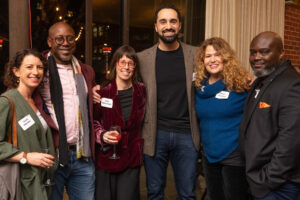 “We are extremely appreciative of this partnership,” said MK Palmore, President of Cyversity and Director of the Office of the CISO for Google Cloud. “I care about the idea of helping individuals achieve what it is that they’re interested in achieving. That is absolutely what it boils down to…. I’m thankful that we have the opportunity to spend even a little bit of time at the end of this year to decompress, socialize with one another, network, and talk about how we can help each other.”
“We are extremely appreciative of this partnership,” said MK Palmore, President of Cyversity and Director of the Office of the CISO for Google Cloud. “I care about the idea of helping individuals achieve what it is that they’re interested in achieving. That is absolutely what it boils down to…. I’m thankful that we have the opportunity to spend even a little bit of time at the end of this year to decompress, socialize with one another, network, and talk about how we can help each other.”
CLTC Executive Director Ann Cleaveland explained that CLTC’s partnership with Cyversity directly aligns with the center’s mission to “focus on the future, in order to amplify the upside of the digital revolution” and to “expand who participates in cybersecurity.” She noted that diversity in cyber is important both from a disciplinary perspective, and from a demographic perspective, in terms of “which communities are receiving cybersecurity assistance, which communities are providing cybersecurity assistance, and how we think about under-resourced organizations and their access to cybersecurity.”
Cleaveland noted that CLTC has continued to advance its goals around “expanding access” throughout 2023 — including through its leadership in securing funding from Google to expand the Consortium of Cybersecurity Clinics, organizing the first-ever Cyber Civil Defense Summit, an event dedicated to promoting cybersecurity for the public interest, and leading Cybersecurity Futures 2030, a foresight-focused scenario planning exercise to inform cybersecurity strategic plans around the globe.
“All of your leadership and cybersecurity continues to inspire us at CLTC,” Cleaveland told the Cyversity team. “It warms our hearts, and I don’t foresee a time when we wouldn’t continue this partnership.”
“Lift while you climb.”
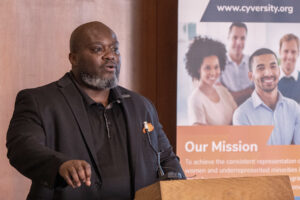
The first keynote speaker at the event was Marco Lindsey, Associate Director of Diversity, Equity and Inclusion at the UC Berkeley Haas School of Business. Lindsey is a board member of Boost at Berkeley Haas, a pipeline program that prepares and supports high school students with college preparedness, life skills, professional development, and mentorship.
“I’m a huge fan of the UC Berkeley community. I love this community. But I’m also a Black man from Oakland. And a lot of my experience, a lot of the way that I view life, is surrounded in this idea of equity,” Lindsey said. “Growing up, I never saw a Black engineer. I never saw a Black lawyer. I never saw a Black doctor. And so growing up, I never knew that I could aspire to those things. It never even crossed my mind. So for me today, I still live in my community, because I think it’s important for the people in my community to see me.”
Lindsey explained that he works with the Bay Area chapter of 100 Black Men of the Bay Area, a group of African American men from various professional backgrounds that work to provide role models for youth in underrepresented communities. “It is important to give back to our communities, to use whatever talent that I have to help bring others up,” Lindsey said. “There’s this idea, ‘lift while you climb.’ And so when I first started a lot of these endeavors, that was on my mind.”
Lindsey talked about his past efforts to pair high school students from Oakland with opportunities in the technology sector — including an event at which students had opportunities to connect with tech companies like Google, Facebook, and Yelp. “I heard a professor tell a student that 60-70 percent of jobs in tech don’t involve coding, and a light bulb went off in my head, because I realized that a lot of people in communities of color don’t know that,” he said. “We had about 10 or 12 different organizations there to talk with about 300 Black and Brown people about the opportunities in tech, and it was mind blowing. From that experience, people got jobs.”
Lindsey praised the progress made to date, but stressed that there is still much work to be done to ensure that cybersecurity is an inclusive, diverse field. “The energy it takes to get you to the mountain is not the same energy it’s gonna take to get you over the mountain,” he said. “If we’re going to solve tomorrow’s problems, if we’re going to create a more sustainable future for the next generation, it’s going to take some different voices in the room.”
“It’s critically important.”
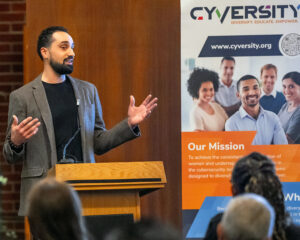 The second presentation was delivered by Justin Steele, Director of Google.org, Google’s philanthropy arm, in the Americas region. “I have the privilege of giving away Google’s money and connecting nonprofits to Google’s talent and products,” Steele said.
The second presentation was delivered by Justin Steele, Director of Google.org, Google’s philanthropy arm, in the Americas region. “I have the privilege of giving away Google’s money and connecting nonprofits to Google’s talent and products,” Steele said.
He explained that he has learned firsthand the challenge of cybersecurity in the course of launching a non-profit, Outdoorithm, which aims to bring youth from urban centers into the outdoors. “Cybersecurity freaks me out,” Steele said. “I’ve been learning in real time how important this stuff is, and how intimidating it is to be responsible for user data. As a small startup founder, I deeply appreciate the work that you all are doing. It is important work, and it’s a super privilege for us to be able to support it.”
Steele was closely involved in Google’s decision to support the continued expansion of the Consortium of Cybersecurity Clinics, and he praised CLTC’s leadership in expanding the clinic model. “We caught the bug. You gave us the bug. And $20 million later, we are running like a national competition to fund cybersecurity clinics…. What’s beautiful about these clinics is that students are getting a chance to learn on the job,” Steele said. “I’m super proud that we’re able to have that collaboration and partnership together. It’s a win-win of training up students and being able to protect critical infrastructure to be able to support nonprofits. It’s a really critically unique and important thing.”
The presentation portion of the evening concluded with video messages from students who have benefited from the work of Cyversity, as well as speech by Gowri Swami, a 2024 Cybersecurity Research Fellow, who explained how financial support has enabled her to pursue research on whether and how AI-generated “speech” should be governed or regulated online. “When I came to graduate school at UC Berkeley last fall, one of my main goals and aspirations was to really ask novel questions and go out there and be curious, because at the end of the day, Berkeley is a research institution,” she said. “But in the professional degree programs, a lot of the time we aren’t given the funding or the opportunities to actually go out and ask that question. And that’s where CLTC really stepped in for me…. Whenever anyone asks me, why is Berkeley so unique and such a wonderful research institution, it’s really because of programs like CLTC, which gives students the opportunity to go out and ask these questions and be curious as we go out into the world.”
Watch below for an excerpt of comments by Gowri Swami, Cal Cybersecurity Research Fellow.

